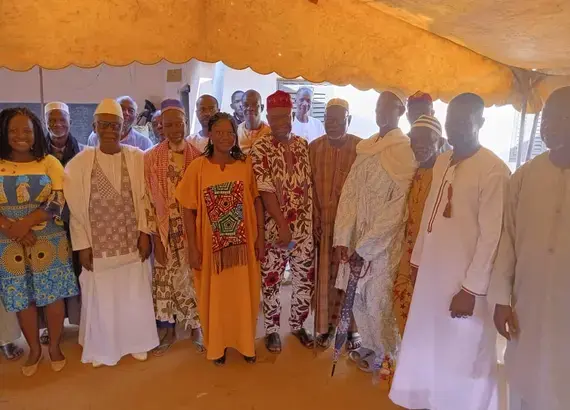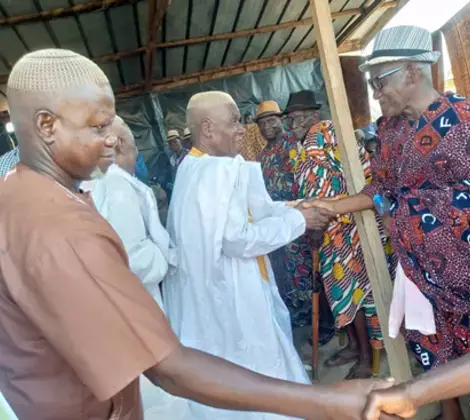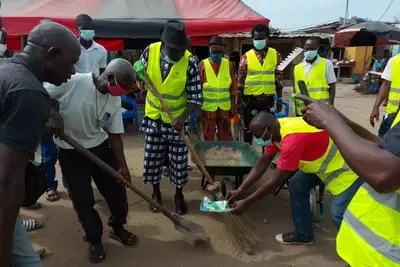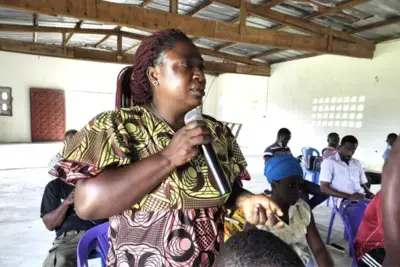
Group photo of Daoukro community leaders during the day of forgiveness and peacebuilding on July 15
Success Story
Reconciliation and Peacebuilding in Côte d'Ivoire
In the heart of Daoukro, a city with deep political and cultural significance in central Côte d'Ivoire, the past three years have witnessed a troubling descent into conflict and division. It began in 2019 when clashes erupted between youth from different ethnic groups (Malinké and Baoulé), triggered by a brutal killing that was allegedly perpetrated by members of one group against the other, which set off a chain of escalating tensions. Violence during the 2020 elections further exacerbated these divisions, resulting in violent confrontations and casualties. These lingering grievances gave rise to mistrust that cast a shadow over daily life for more than two years, despite several false starts and failed efforts to reconcile led by local leaders, the government and non-governmental actors.
But in August 2022, the National Democratic Institute (NDI) initiated a new dialogue process by organizing formal and informal community dialogues led by community leaders it had trained on facilitation skills and trauma sensitivity. This initiative promoted tolerance, increased interactions fostering peace, and ultimately led to a breakthrough. Unlike past efforts, the committee included men, women and young people from each of the ethnic groups – Baoulé (locally referred to as autochtones or native people); Malinké (referred to as allochtones or Ivoirians who settled in Daoukro from other parts of the country); as well as residents who originally came from neighboring countries (called allogènes). These leaders met to discuss how to convince their respective communities to agree and separately had a series of meetings with their communities to bring them along.
Initially, all sides remained resolute, their grievances and suspicions entrenched after years of mutual recriminations. The autochtones were willing to engage in dialogue with the allochtones and allogènes, but they insisted on an apology and material compensation as a means of reconciliation. The Malinké community (allochtones) initially resisted, as they saw the violence's origin as individuals from outside the city. Nevertheless, an agreement was finally reached through behind-the-scenes negotiations and informal talks.

With an agreement finally achieved among community leaders, it was important to carry the message to the public. On July 15, NDI and community leaders organized a “Day of Forgiveness and Peacebuilding” that brought together more than 200 community members, political figures, religious leaders, artists and members of the security forces. The day was the culmination of the committee and community leader’s shared achievements in bridging divides and dismantling walls of mistrust. A radio discussion conveyed the key developments to the residents of Daoukro and its neighboring villages, bringing news of the reconciliation efforts to the public.
A significant moment during the Day of Forgiveness and Peacebuilding was a symbolic soccer match. For the first time, this match was played by teams made up of youth from all of the city’s ethnic groups mixed together, rather than pitting a Malinké team against a Baoulé team as has been traditional for mixed group matches. Players reported that working on the same side symbolized unity for them and resonated deeply within the community; it broke down barriers that had once divided these groups and fueled mistrust. A youth association leader present at the match remarked, “The match that we just played is truly a match for social cohesion… Normally, in [this kind of match] the ethnic communities play against each other and often at the end we finish without really reconciling. Today we are all happy because both communities are happy. Neither won, neither lost, it’s Daoukro that won.”
With support from NDI, leaders from the autochtones, allochtones and allogènes communities overcame ethnic and cultural barriers to find peace and solidarity with one another. This created a safer ground for collaboration, peaceful interaction and for a much larger community to assemble in Daoukro. This cohesive and collaborative effort underscores NDI values, working to advance equity and inclusion in the region. Dr. Cooper Sathasvan, a guest of Minister Kouadio, who had spent nine years in prison with Nelson Mandela during South Africa's apartheid era, joined hands with Malinké and Baoulé community representatives in a symbol of reconciliation, and delivered a powerful message “Thank you on behalf of all of us, for all of humanity, for your choice to make peace, to forgive, to work together… to ensure that our children, our women, do not suffer the hardships of our disputes, our divisions, so that they can dream of peace and not the nightmares of the past.”


